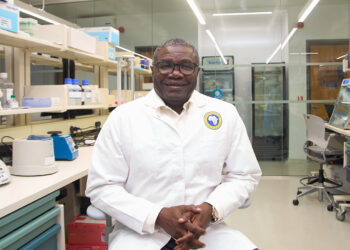
In What We Can Know, large swathes of the UK are underwater
Westend61/Getty Images
What We Can Know
Ian McEwan (Jonathan Cape (UK); Knopf (US))
The latest novel by Ian McEwan, What We Can Know, is an extraordinary piece of work that defies neat categorisation.
The story is largely narrated by a man named Tom Metcalfe, an academic at the University of the South Downs, UK, in the year 2119. The seas have risen dramatically, and only the highlands of the UK remain above water. For Tom to travel to, say, the Cotswold Islands, he must hire a boat and a captain. Marlborough is now a port, and a journey to as far north as what used to be the Lake District is out of the question, thanks to pirates.
The world is transformed; life is frugal. There are far fewer people, though they are crowded together on scraps of remaining land. The profligacy of the “Derangement”, as the long period before the seas rose is now called, has vanished.
However, this future world is only one strand of the book. Tom is a historian, and what he is particularly interested in, as it happens, is something very specific: a dinner party given in 2014, long before climate change hit the UK hard. He is interested in all the people who attended that soirée, and the allegedly great poem that the host, a poet called Francis Blundy, read to his guests that evening.
Hence, the second strand of this novel is a deep dive into that middle-class, literary-set dinner party – the sort of event you can well imagine McEwan attending in real life. That might sound like quite a stretch, but it made increasing sense to me as the book went on.
“
No one outside the dinner party ever heard the poem, and no hard copy was ever circulated
“
Tom’s reasons for digging ever deeper into that dinner are manifold. In the story, the poem read out that night went on to be held up as a great work that railed against climate change, and was said to have been suppressed by big oil. Yet no one outside the party ever heard it, and no hard copy was ever circulated. Was the poem about climate change or something else entirely? It is a literary mystery.
What’s more, Tom has learned that for his students to become interested in the art of the past, they must first accept the artists of the past as real people. The only way to achieve that, he tells us, is to provide detail about the dead. So the lives of Blundy, his wife Vivien and their set matter deeply to him.
There is also a personal aspect to Tom’s growing obsession with the Blundys. After years of study, he believes he has built up a portrait in his mind’s eyes of everything that happened that fateful night, and he feels he now knows Vivien, in particular, very well indeed. He may even be in love with her.
Then Tom finds a clue that might lead him to the poem.
This novel won’t be for everyone, but then, what novel is? I ended up absolutely loving it. It is sensationally well written, as you would expect from McEwan, and it is a very clever and thought-provoking book indeed, with many surprises contained within it. I failed to spot, or at least piece together, all of the clues laid out for me, so I was amazed by every twist.
I found What We Can Know‘s depiction of our drowned future rather twinkling and magical: it had a bit of Swallows and Amazons, crossed with Hobbiton, to it. I also found the detailed and serious portrait of Vivien and the men in her life to be gripping.
The novel stayed with me for several days after I finished it. It makes you think about climate change and the denial thereof, love and deceit, how accurate histories can ever be, whether we can ever know another person’s heart… among many other things! I thoroughly recommend it.
Emily also recommends…
Briefly Very Beautiful
Roz Dineen (Bloomsbury (UK); The Overlook Press (US))
This novel, first published last year, paints a very different picture of the UK after severe climate change. Dineen imagines a hot future, rather than a drowned one. But, like What We Can Know, the novel also deals with powerful themes of intimacy, memory and loss.
Emily H. Wilson is a former editor of New Scientist and the author of the Sumerians trilogy, set in ancient Mesopotamia. The final novel in the series, Ninshubar, is out now. You can find her at emilyhwilson.com, or follow her on X @emilyhwilson and Instagram @emilyhwilson1

The art and science of writing science fiction
Take your science fiction writing into a new dimension during this weekend devoted to building new worlds and new works of art
Topics:
- Science fiction/
- Book review
Source link : https://www.newscientist.com/article/mg26735610-500-ian-mcewans-new-novel-weaves-climate-change-into-literary-mystery/?utm_campaign=RSS%7CNSNS&utm_source=NSNS&utm_medium=RSS&utm_content=home
Author :
Publish date : 2025-09-17 18:00:00
Copyright for syndicated content belongs to the linked Source.








